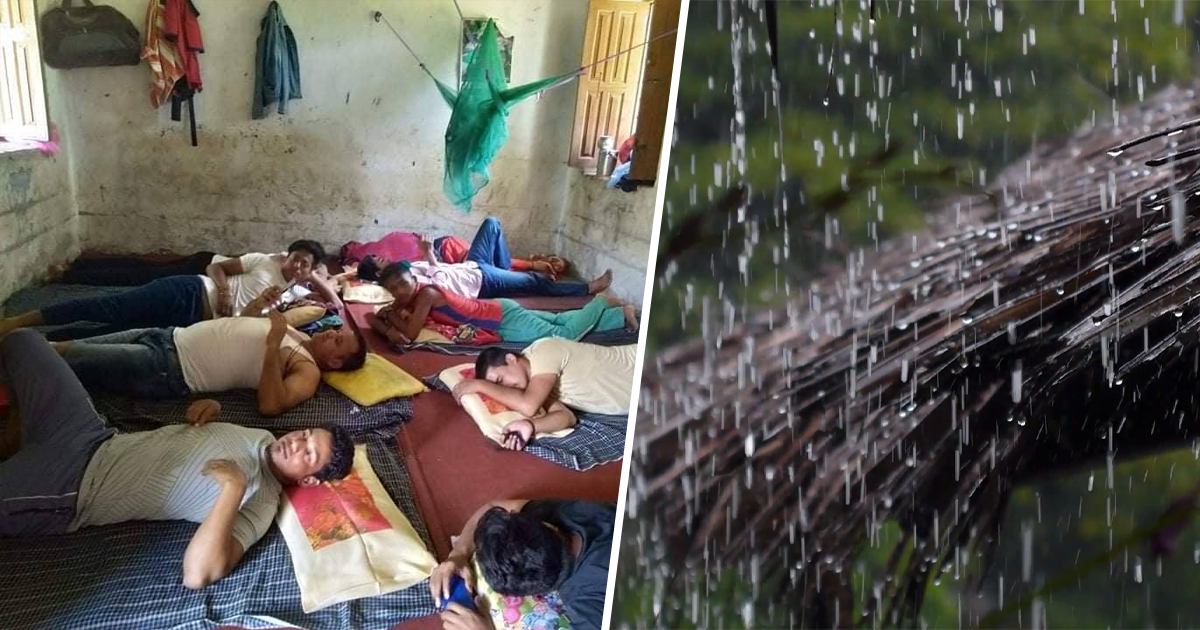KATHMANDU: COVID-19 panicked people living in quarantines are in trouble with the rainy season looming closer endangering their lives both from the coronavirus and natural disasters like storms, lightning, and not to forget snakebites.
India-returnees in Kailali, Baitadi and other districts are not allowed to enter their houses by their relatives and villagers unless they get their PCR tested.
Jung Bahadur Saud of Bhajani 5, Kailali reached his hometown via Gauriphanta checkpoint. He stayed in a quarantine facility set up for 14 days in Karmeshwor.
After passing the quarantine period, the municipality arranged for the RDT test of all people like him. Delighted with his RDT negative result, he and 7 others went home. However, unfortunately, they did not get an entry in their homes as villagers sent them back compelling them to live in make-shift shelter in Milan Nursery Community Forest.
“We hardly sleep in tents built in the forest because of the fear of wild animals, snakes, scorpions and the mosquitoes. Life is hell here.”
With the poodles and the rain leakage in the shelter, they are now allowed to live in the pen meant for goats.
“More than coronavirus, we fear the snakes, scorpions, wild animals and mosquitoes,” Saud expressed his sorrow. “If the government had tested our swab, we could have gone home,” he argued.
With growing skepticism towards the reliability of RDT tests, the locals have forbidden the India-returnees to enter their home or village unless they have their PCR tested.
Layak Ram Chaudhary, the Ward Member of Tikapur-6 has been guarding the quarantine set up in the National Secondary School, Beluwa.
There are 55 people, including 18 females, all returned from India.
Chaudhary was horrified at the sight of a 5-feet long krait at the toilet door of the tent at 11 PM. It’s a venomous snake taking the lives of many people in the Terai region. More than a dozen youths staying in the quarantine came out and managed to kill it.
Most of the quarantines established in the old and poorly-cared schools, colleges, or public buildings and the open space have exposed the coronavirus, panicked people, to death from snakebite and insect-related hazards.
Snakes are turning common sights in terai quarantines these days.
There are around 5 million cases of snakebites and 100 thousand deaths caused by it every year globally.
Although there is no exact data of snakebites and the fatality related to it, it is estimated that there are nearly 1000 deaths caused by it in Nepal.
Chaudhary informed that they have killed five venomous snakes in the area so far.
Dharma Raj Sharma the Headmaster of Karnali Secondary School, Tikapur agrees that the quarantines are likely to be the incubation sites for the coronavirus panicked people.
“Most of the structures set up for quarantines or used as quarantines are not much safe, they are dirty and poorly cared,” Sharma said. “The people living in such structures are vulnerable to snake, scorpions and insect bites; out from frying pan, they are falling into the fire.”
Mismanaged quarantine, poor progress in PCR test
Like Bhajani’s Jung Bahadur Saud, Kishor Karki of Melauli-7 also came to Nepal around 20 days ago via Gauriphanta checkpoint.
Karki, who expected better facilities in Nepal than the ones he lived in India before entering here, is shattered at the poor management in his present quarantine.
“We, 88 people, are living in a school sans water in the toilet. The quarantine is worse,” he said in a breath, “Even after 19 days in quarantine here, we are not sent home yet.”
Not only the physical structure of the facilities used as quarantine, but the management is also worse as well. Sick people hardly get medical facilities.
A heart patient lost her life on Tuesday in a quarantine set up in Purchaudi-4 based Malika Secondary School. Although the swab test report showed her coronavirus negative, she died not getting her regular medication.
Narayan Chand, the Head of the Health Department in Melauli Municipality confessed that the management of quarantine facilities is getting more challenging with a large number of India returnees.
“Our systems set up for fewer numbers are turning insufficient with the population pressure in such setups,” he said.
The areas with a high number of people returning from India are under much pressure in all ways, as they are turning incubation centers making the community more vulnerable to transmission; hence they need prompt guidance and support from the province and federal governments.
More than 41000 Nepalis have returned to Karnali Province from India till date.









Comment